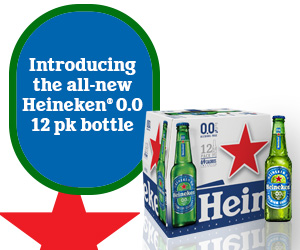

Nick Fede Jr., Executive Director, Rhode Island Liquor Operators Collaborative.
Is It the Right Solution for Rhode Islanders?
By Nick Fede, Jr., Director, Rhode Island Liquor Operators Collaborative
For the past four legislative sessions, the notion of implementing a deposit return system, otherwise known as the Bottle Bill, has been debated in the General Assembly and spearheaded by Rep. Carol McEntee (D-South Kingstown/Narragansett).
The intent of the legislation is simple: to protect the environment. Rep. McEntee’s efforts led to the creation of the Special Joint Legislative Commission to Study and Provide Recommendations to Protect Our Environment and Natural Resources from Plastic Bottle Waste at the finale of the 2023 legislative session.
The commission, co-chaired by Rep. McEntee and Sen. Mark McKenney (D-Warwick), was composed of various stakeholders in the conversation, including individuals from our industry. Jackie Mancini of Mancini Beverage, Bob Swartz of Southern Glazer’s Beverage Company and I were all happy to serve on the commission and provide the perspective of the beverage alcohol industry.
Early on, the goal of the chairpeople became abundantly clear: In order to remove waste from our environment, the onus of reinventing our state’s recycling system was to be put on the industry. Let it be clear, we are no fans of litter and of those who actively litter. Littering is perhaps one of the most shameful nonviolent things one can do and we all must do our part in making sure our recycling system works the way it should. However, after more than 20 hours of commission hearings, one thing was abundantly clear to me: We were missing the plot entirely.
Rhode Island’s Materials Recycling Facility was last renovated in 2012, when Rhode Island Resource Recovery Corporation (RIRRC) moved to “single-stream” recycling, which processes paper, cardboard and containers together. Although cutting-edge at the time, single-stream recycling has led to an increase in rejected loads at RIRRC due to contamination because of comingling of materials.
In an effort to correct this problem, RIRRC, in collaboration with the Rhode Island League of Cities and Towns, just last month began to consider rejecting partial loads, opposed to the previous policy of rejecting full loads, even when just a portion was contaminated.
As reported by WJAR-10, “Every week, truckloads of recycled waste are dumped into a landfill after getting rejected at Rhode Island Resource Recovery for having a contamination level of 10% or more. Roughly 29,000 tons of rejected recycling ended up in Rhode Island’s landfill last year, enough to fill 895 football fields. That represents 4,900 more tons than 2023 and over 23,000 more tons than 2019, indicating the problem is getting worse instead of better.”
 The WJAR report continued: “(Providence Mayor Brett) Smiley says while the city needs to do better with recycling, Rhode Island Resource Recovery uses an antiquated process that unnecessarily rejects items. ‘If moisture or rain gets into a barrel, cardboard or paper materials get soggy, they will reject that,’ Smiley said. ‘For example, with soggy cardboard, it can get into the gears of the sorting materials, but there are other more advanced sorting facilities that have solved this problem.’”
The WJAR report continued: “(Providence Mayor Brett) Smiley says while the city needs to do better with recycling, Rhode Island Resource Recovery uses an antiquated process that unnecessarily rejects items. ‘If moisture or rain gets into a barrel, cardboard or paper materials get soggy, they will reject that,’ Smiley said. ‘For example, with soggy cardboard, it can get into the gears of the sorting materials, but there are other more advanced sorting facilities that have solved this problem.’”
In response, RIRRC plans to replace its current system and will release a request for qualifications for facility design and support services by early summer. A spokesperson for the corporation said, “RIRRC will be looking for a design that increases its ability to handle higher levels of inbound contamination whether those are driven by material type, size, compaction moisture concerns, etc.”
Imposing a deposit return system on Rhode Island voters, who are already feeling the financial pinch, is not an appropriate solution at this time. Legislators have an opportunity to have a direct impact on consumer prices at the cash register. If a deposit return system is enacted, it will raise prices on every consumable consumer product in a container, from your 5-Hour Energy to your 30-pack of beer and your case of bottled water. Now is not the time to raise prices at the cash register.
While a deposit return system may be an effective way to recycle, it is not the only way. Doubling down and improving our current system, paired with newly available educational grants from RIRRC, should get Rhode Island’s residential recycling programs back on track.











